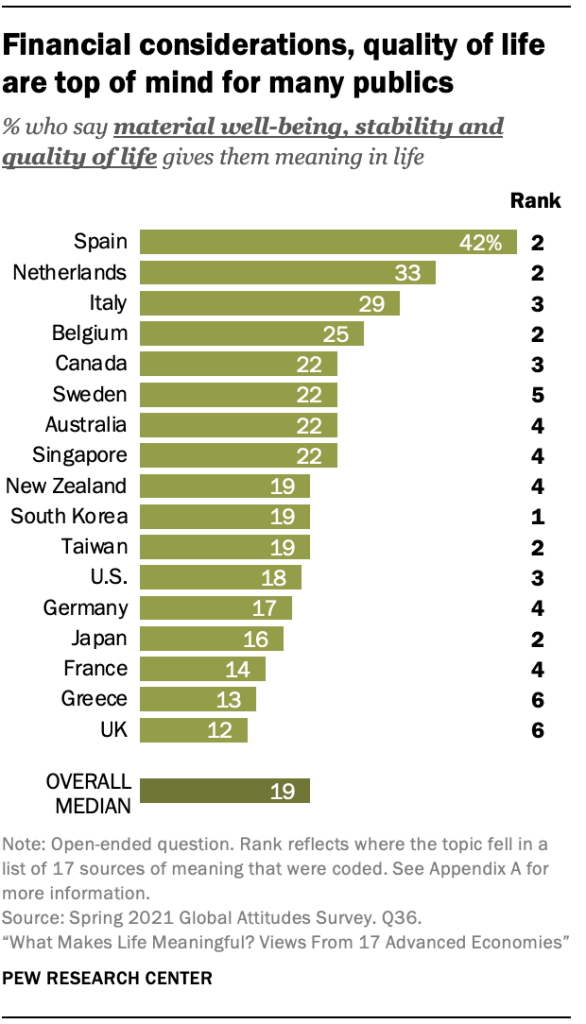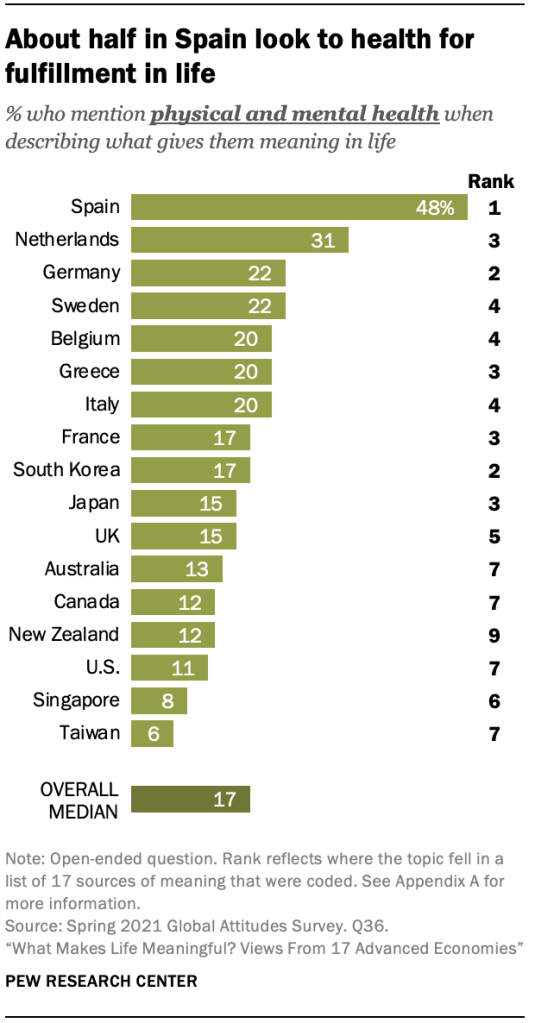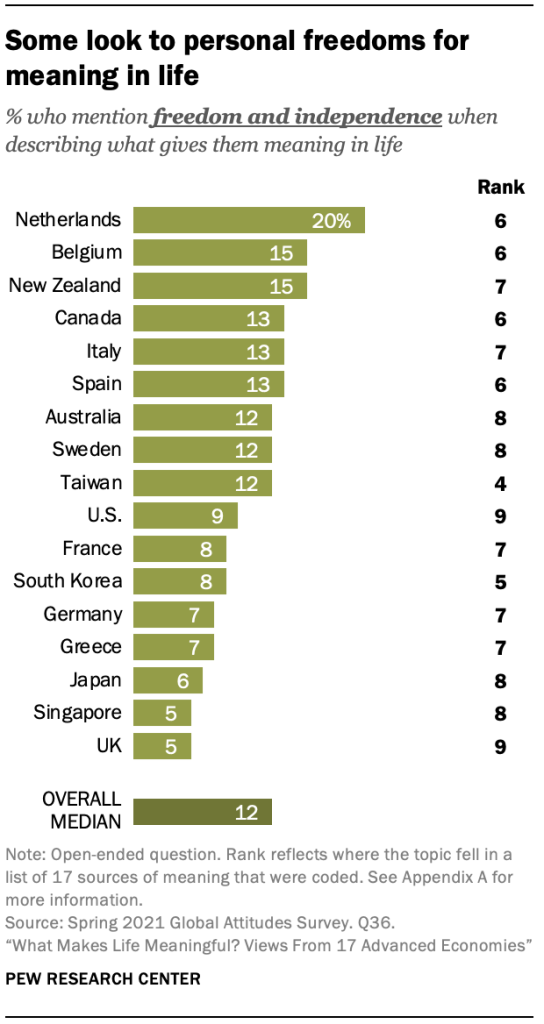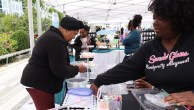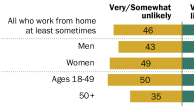Certain conditions allow people to lead fulfilling lives. Most notably, in nearly all of the 17 publics surveyed, material well-being, stability and quality of life collectively rank as one of the top five sources of meaning – with people noting the importance of everything from basic necessities (food, a roof) to luxury (good food or wine) as part of what enables them to find meaning. People also cite the importance of physical and mental health as well as freedom and independence.
Material well-being, stability and quality of life
When describing their sense of meaning and fulfillment in life, many in these advanced economies mention their material well-being, stability or quality of life – including whether they have enough money to live comfortably, their ability to afford necessities, their standard of living and whether they feel safe and secure. Quality of life is among the three most common topics in just over half of the publics surveyed, including Spain – where it outranks family – and South Korea, where it is the most mentioned topic overall.
Respondents often express appreciation for their economic circumstances and their ability to live comfortably. “I work and lead a comfortable life in these hard times without any major worries,” explained one South Korean woman. “I’m living comfortably, well-fed, I’ve got a roof over my head, food in my cupboard, I’ve got everything I need to survive,” said a man in New Zealand.
Others are thankful to have enough to afford what they consider a modest, normal life. “Living a life without luxury, a normal life.
“I’m married, have a house and a garden, a good car. I am content, what more could I ask for? As long as I can live without having to worry about money.” –Man, 40, Germany
Being able to pay for a home, food, the basics. Being able to go out for a beer and having the right to a home, to a job and to food, rights that should be the same for everyone in the world. Living with dignity,” explained a woman in Spain. “Although I don’t have that much money, it’s enough to live decently. I don’t need to be rich to be happy. I know that one needs money to live, but should not live for money,” offered a woman in Belgium. Others do not consider themselves so lucky: “I would like to feel that food and other necessities will not take over half of my income. The cost of utilities are on the rise and it’s harder for me to pay my bills because I’m on a fixed income,” explained one man in the U.S.
In most publics, less affluent and more affluent people are about equally likely to mention their material well-being when talking about what makes their lives meaningful.
Physical and mental health
Some people point to health as a source of meaning in their lives. These mentions of health include references to both mental and physical health, as well as the respondent’s own health and the health of their loved ones. Also included are references to practices of wellness, such as meditation, working out and various forms of exercise. Typically, people express appreciation for good health, such as one woman in Germany who declared, “I am glad my health is good; for background: I am disabled,” or enjoyment of a wellness practice, like this Belgian woman: “I also work out and enjoy food.”
References to health as a source of meaning in life are generally most prevalent among the European adults surveyed, ranging from 15% of responses in the UK to 48% in Spain. Uniquely, in Spain, health is the top source of meaning among all those coded. Roughly a fifth (17%) of South Koreans also see health as part of what gives life meaning – though this makes it the second most referenced topic there, behind only material well-being. In Germany, too, health is the second most cited source of meaning, and in the Netherlands, Greece, France and Japan, the topic ranks third.
“Mainly to be healthy and then to have a job to be able to live, and logically to live in as healthy a place as possible, which is the most important thing.” –Man, 47, Spain
In eight of the 17 publics surveyed, older respondents are more likely to bring up health in the context of what gives life meaning. The difference is starkest in the Netherlands: While just 17% of Dutch adults ages 18 to 29 reference health, 38% of those 65 and older bring up the subject, a difference of 21 percentage points.
Women also more frequently mention health in six publics. In Spain, for example, 39% of men mention health compared with 56% of women, a 17-point difference.
Freedom and independence
Freedom and independence is commonly mentioned as an important source of meaning. In many cases, people mention freedom in a personal sense, referring to their ability to live the way they want, their work-life balance, or having or wanting free time. For example, one Italian man noted, “A satisfying life is one where there is a good balance between the hours spent on work and free time. At the same time, compensation should be adequate. The last lockdown taught us to relate to ourselves better and to cherish restoring our own minds and bodies.” Another man in Germany expressed satisfaction: “I have more time for my hobbies since working from home. I have more time for my family and even more time for self-care during this crisis.” Freedom of choice stands out for others, like this Dutch man who said, “At present, I find it important that I have the choice to decide what I want to do. I like having the freedom to decide what I want to do.”
In other cases, freedom is brought up in a more general, political sense – highlighting things like freedom of speech and religion. Explained one man in the U.S., meaning comes from “freedom of religion and freedom of the free exchange of ideas, [though] the Democratic Party is systematically dismantling both of these.”
Freedom and independence is mentioned most frequently in the Netherlands, with one-in-five bringing up the topic. At least one-in-ten also bring up freedom in Belgium, New Zealand, Canada, Italy, Spain, Australia, Taiwan and Sweden.
“Freedom, that is the most important thing. Freedom to be able to do what you want without hurting others. People have to be free to do what they want without hurting anyone.” –Man, 61, Sweden
For Taiwan, this makes freedom the fourth most mentioned topic, and freedom makes the top five factors in South Korea. In the Netherlands, Belgium, Canada and Spain, freedom is the sixth mentioned factor for meaning.
In six publics, those with higher incomes are more likely to bring up freedom when discussing the meaning of life. The difference is greatest in New Zealand, where those with incomes at or above the median are twice as likely as those with lower incomes to refer to freedom (22% vs. 10%). Similar differences also emerge between the more and less educated in four publics. In Germany, 11% of those with postsecondary educations mentioned freedom and independence, compared with 5% of less educated adults.
In the U.S., Republicans and Republican-leaning independents are about twice as likely as their Democratic counterparts to bring up freedom. One Republican man, for example, pithily explained his sources of meaning as “one word … FREEDOM!!! To be able to live a life with the freedom to choose and to take care of family.” Outside of the U.S., however, there are no differences with regard to how often freedom comes up as a source of meaning between those who support and those who do not support the governing party – except in Taiwan (for more on how the governing party is defined, see Appendix D). And while those who identify with the ideological right are more likely to cite freedom than those on the left in the U.S., the opposite is true in Italy and Spain.
